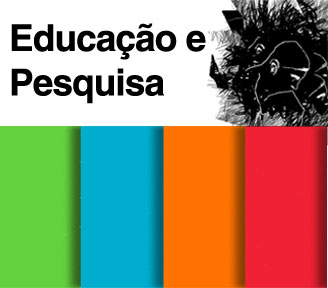Complexity Knowledge and Pedagogical Practices
DOI:
https://doi.org/10.1590/S1678-4634202248245243porKeywords:
Complexity, Seven complex lessons, Pedagogical practiceAbstract
This study deals with a research conducted with Brazilian and Portuguese teachers through an online course that aimed to design a continuing education approach that integrated basic, undergraduate and graduate education teachers, based on the “Seven Complex Lessons in Education for the Future.” To this end, it focused on the “lesson” that deals with error and illusion, from Edgar Morin’s perspective. The problem that guided the investigation sought to analyze participants’ perceptions about the influence of pedagogical practice, methodology and the proposed learning on a transformation in teaching. The research used a qualitative, action-research approach, and the data was submitted to content analysis using the IBMS Statistics program. Results indicated the occurrence of reflections about the need to consider a thought-reform approach to education, one that overcomes the fragmentation of knowledge. About student engagement in activities proposed by the teacher in class, participants were found to value interdisciplinarity, collaboration, collective work, and the mediation role, and to recognize the influence of psychological aspects on students’ interest in and motivation for learning. Finally, the need to overcome determinist thoughts was considered, thus allowing participants to understand that knowledge is subject to errors and illusions also in education, and that expanding human thought can help in the search for solutions to educational problems.
Downloads
References
BARDIN, Laurence. Análise de conteúdo. Tradução de Luiz Antero Reto e Augusto Pinheiro. São Paulo: Edições 70, 2016.
BRASIL. INEP. Instituto Nacional de Estudos e Pesquisas Educacionais Anísio Teixeira. Thesaurus brasileiro da educação, Brased. Disponível em: http://portal.inep.gov.br/thesaurus-brasileiro-da-educacao Acesso em: 07 jun. 2019.
» http://portal.inep.gov.br/thesaurus-brasileiro-da-educacao
DELORS, Jacques (coord.). Os quatro pilares da educação. In: DELORS. Jacques. Educação: um tesouro a descobrir. São Paulo: Cortez. 1998. p. 89-102.
DEMO, Pedro. Professor do futuro e reconstrução do conhecimento. 6. ed. Petrópolis: Vozes, 2009.
DUARTE, Sérgio Guerra. Dicionário brasileiro de educação. Rio de Janeiro: Antares Nobel, 1986.
IMBERNÓN, Francisco. Formação permanente do professorado: novas tendências. Tradução de Sandra Trabucco Valenzuela. São Paulo: Cortez, 2009.
KOOGAN, A Abrahão; HOUAISS, Antonio. Koogan/Houaiss: enciclopédia e dicionário ilustrado. 4. ed. Rio de Janeiro: Delta, 1999.
MORIN, Edgar. A cabeça bem-feita: repensar a reforma, reformar o pensamento. Tradução de Eloá Jacobina. 22. ed. Rio de Janeiro: Bertrand Brasil, 2015a.
MORIN, Edgar. Ensinar a viver: manifesto para mudar a educação. Tradução de Edgard de Assis Carvalho e Mariza Perassi Bosco. Porto Alegre: Sulina, 2015b.
MORIN, Edgar. Introdução ao Pensamento complexo. Tradução de Eliane Lisboa. 4. ed. Porto Alegre: Sulina, 2015c.
MORIN, Edgar. Os sete saberes necessários à educação do futuro. Tradução de Catarina Eleodora F. da Silva e Janne Sawaya. 3. ed. São Paulo: Cortez; Brasília, DF: Unesco, 2001.
NICOLESCU, Basarah. O manifesto da transdisciplinaridade. Tradução de Lúcia Pereira de Souza. São Paulo: Trion, 1999.
PIMENTA, Selma Garrido. Para uma ressignificação da didática: ciências da educação, pedagogia e didática. In: PIMENTA, Selma Garrido (org.). Didática e formação de professores: percursos e perspectivas no Brasil e em Portugal. 6. ed. São Paulo: Cortez, 2011. p. 23-87.
THIOLLENT, Michel. Metodologia da pesquisa-ação. 18. ed. São Paulo: Cortez. 2011.
Downloads
Published
Issue
Section
License
Copyright (c) 2022 Educação e Pesquisa

This work is licensed under a Creative Commons Attribution-NonCommercial 4.0 International License.
Authors assume exclusive responsibility for the concepts expressed in their articles, which do not necessarily reflect the journal’s opinion.
Permission to photocopy all or part of the material published in the journal is granted provided that the original source of publication be assigned.



